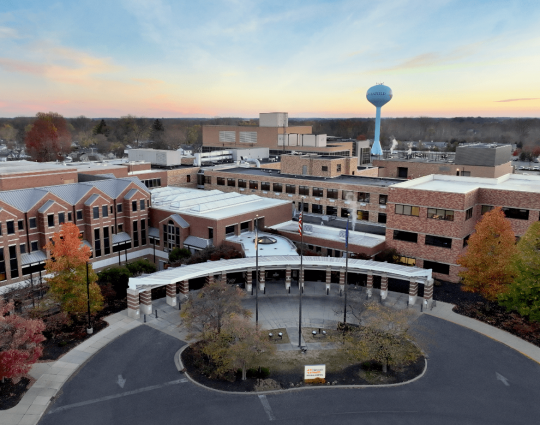Sleep Disorders
Sleep supports healthy brain function, and not getting enough of it can raise your risk of developing high blood pressure and other chronic health problems. If you have trouble falling asleep or wake feeling fatigued, the Hancock Health Sleep Center can diagnose and treat your condition’s causes.

Do I need a sleep study?
Without treatment, sleep disorders can lead to daytime drowsiness and more serious health problems that can include high blood pressure, congestive heart failure, heart attack, diabetes, or stroke.
You may benefit from consulting a sleep specialist if you experience any of the following symptoms:
- Difficulty falling asleep or staying asleep
- Loud snoring or gasping
- Disrupted sleep
- Poor quality sleep
- Daytime fatigue
- Aches and pains, especially back pain
- Unusual behaviors during sleep (such as sleepwalking or sleep talking)
Our diagnosis of a patient’s sleep disorder is achieved through short-term or long-term EEG studies. While some assessments are performed in our lab’s comfortable, hotel-like sleep suites, others may be conducted in the familiar surroundings of your own home with CPAP (continuous positive airway pressure) machines.
Your method of treatment will be determined by the type and severity of your disorder, and can range from medication to the recommendation of personal CPAP equipment.
When CPAP treatment is appropriate, we help patients find the machine that’s right for them—then provide one-on-one instruction and remote monitoring services that ease long-term effectiveness and continued support from insurance.
Call (317) 468-4610 to schedule a consultation.
Types of Sleep Disorders
Some of the most common sleep disorders we treat at Hancock Health include:
Obstructive Sleep Apnea
Obstructive sleep apnea may cause you to stop breathing repeatedly during sleep due to a collapse of the airway. This is often caused by excess tissue in the back of the airway, a decrease in the tone of the muscles holding the airway open, or the tongue closing off the airway. Any of these can prevent air from entering the lungs, disrupting healthy sleep.
Narcolepsy
Narcolepsy is a chronic neurologic disorder where the body fails to distinguish between being asleep and awake. While symptoms vary in frequency and severity, daytime sleepiness occurs in 100% of patients with narcolepsy. Unfortunately, fewer than 50% of narcoleptic individuals are properly diagnosed and are often misdiagnosed with depression, fibromyalgia, or epilepsy.
Periodic Limb Movement Disorder
Periodic limb movement disorder causes movements of the legs and arms that disrupt sleep, sometimes related to restless leg syndrome. The movements occur at regular intervals, usually every 30 seconds, and are clustered into episodes lasting anywhere from a few minutes to several hours. These limb movements may lead to excessive daytime sleepiness or sleep-maintenance insomnia.
RELEVANT LOCATIONS
WELLNESS EDUCATION

Catch Some ZZZs, Naturally
Finding a solution to disorders such as insomnia and sleep apnea can be tiresome. Fortunately,…
Continue ReadingA Long Winter’s Nap
Sleep can be tricky for many people, but never fear—something as easy…
Continue ReadingWhat is Sleep Apnea and How Is It Treated?
Sleep apnea is a serious condition that can lead to diabetes, high…
Continue Reading
